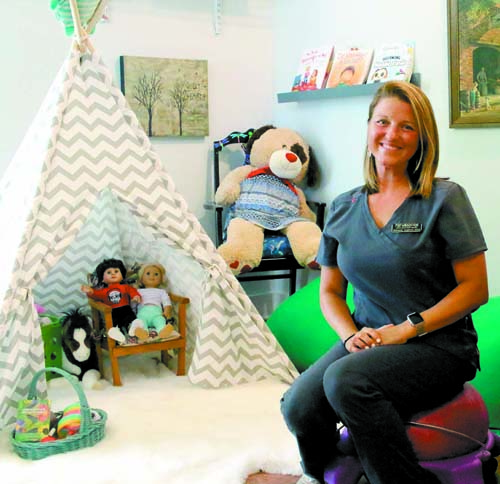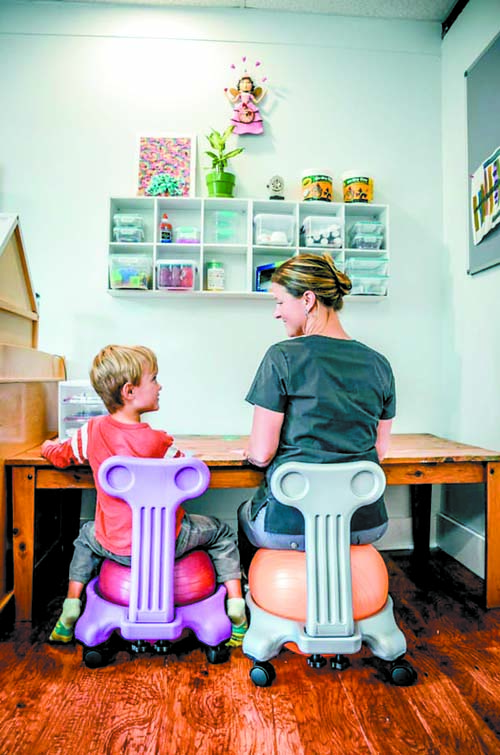Play Warriors help kids through life’s obstacles

Kimberly R. Leighton, B.Ed., CCLS, RYT
Home visits: One hour from Bridgton (Portland, Auburn, North Conway)
Office: 82 Main Street, Suite B-1
Telephone: 329-5545
Website: playwarriorsofmaine.com
E-mail: info@playwarriorsofmaine.com
By Wayne E. Rivet
Staff Writer
When a child experiences illness, trauma, loss or difficult situations, he or she might need someone they feel comfortable with or has a way to help ease a tense or emotional situation.
As a Child Life specialist, Kimberly Leighton helps youngsters “play through life’s obstacles.” Using various techniques along with music and aroma therapy, Leighton assists children through adverse experiences, as well as teaching them coping skills that will aid them throughout their lifetime.
She recently opened a private practice space at 82 Main Street, Suite B-1, in Bridgton. The office includes a meeting area, and a playroom where she works with children, ages two and up.

“This is a space they know they can freely talk. It’s a safe place. A place where they can learn to cope and develop coping skills,” she said.
Sessions run 50 minutes to an hour, but can be longer. Usually, 10 minutes is the handing-off point, talking to parents after the appointment.
Naming the practice “Play Warriors” was the result of Leighton’s early work with a child battling a medical condition. It seemed to encompass her approach, using play to help children tackle difficult situations and obstacles.
“The girl I started working first is a super warrior. She is this fireball of energy, spirit and courage. She has a rare disease that requires infusions once a week until there is a cure for what she is going through. These are ‘warriors’ that are playing through life’s obstacles. They will overcome what is going on in their lives if they have support. If we don’t help them at this level now, things will only escalate as time goes by,” she said.
Her work spans a wide variety of issues from children suffering from anxiety due to medical issues, to youngsters coping with loss or divorce, to kids struggling with behavioral issues. While she spends a bulk of her time with the child, Leighton says child life equally includes the entire family unit.
“I’ve worked with a baby needing shots or having to use a port for treatment, who was extremely apprehensive about it,” she said. “There are support holds I can teach to make it more comforting.”

She has a young client that requires medical infusions.
“First, through the use of a doll, we go step by step. Then, she does it. While being infused, I’ll play with her to keep her distracted or since the IV fluids can be placed in a backpack, we’ll go for a walk,” she said. “I do home visits (about an hour away). I have my Mary Poppins bag that I bring with me. I’ll bring things like the dollhouse and guitar. There’s a music component (soothing) and aroma therapy (calming smells) to help the child relax.”
Leighton wears scrubs because it “normalizes that there are people that are safe; and medical staff (who wear scrubs) are safe. They know that if I am in a medical setting, I will not hurt them in any way. I’m a support and voice for them,” she pointed out.
According to the Play Warriors website, Child Life professionals provide psychosocial support to children, families and their support systems impacted by stress related to significant life experiences. These events could influence typical growth and development and child life professionals aim to minimize the risk of long-term negative effects. Children of all ages may experience emotions such as fear, shame, confusion and loneliness, which can inhibit their natural development. This can also lead to regression in some children and sometimes can cause long-term negative effects without support.
?Some of these adverse child experiences include: Chronic illness of self or loved one; hospitalization or fear of hospitals; loss of a loved one (including pet loss); divorce or family separation; parent incarceration; parent’s substance use disorder; foster care adjustment; victim of bullying; and witnessing violent acts related to domestic violence or natural disasters.
“Children have always been comfortable around me,” Leighton said. “They trust me.”
Leighton somewhat stumbled upon the profession.
While at the University of Maine at Farmington, one of her first classes for Early Childhood Education (she minored in Psychology), Leighton got to sit at a table that instructed the small group to research a certain profession that their degree could be applied to.
“We had ‘child life specialist.’ From the get go, I knew this was something I wanted to do,” she said.
Her focus was on children. Leighton’s practicum was at the Barbara Bush Children’s Hospital, and her internship was at the Shriners’ Burn Hospital for Children in Boston.
Then, she steered off course — she started a family.
She co-founded child care centers in 2006 and 2009, which were holistic-based and quite innovative utilizing meditation, yoga and organic food.
After seven years in childcare, Leighton taught at Headstart for a couple of years, which gave her a chance to visit families and the child in their home environment.
“Even now, I schedule my first consultation at a child’s home. It’s important to see and understand where they are coming from,” she said.
After teaching at the Boxberry School in Harrison, a job opportunity came up at Camp Sunshine.
“It piqued my interest to get back into child life. There weren’t any jobs in child life in Maine, not really. So, when I saw ‘family support specialist’ at Camp Sunshine, I went for it. I worked there the past three years. I went to various hospitals nationally advocating families to come to camp for free. I felt I needed more hands on with the kids’ stuff,” she said. “I had a colleague of mine reach out about working with a medically-complex child. I got insurance so I could see this child at her house, on the side while I was working full-time. I reached out to Psychology Today to see if they would list child life specialist as a profile on their website. They said ‘no.’ So, I sent them research advocating child life, and they said ‘no.’ I sent more material, and they finally said they would. After that, I realized I could make some changes. Since then, other child life specialists have listed profiles there. Now, a lot of people are moving to outpatient practices for child life.”
As secretary for the Lake Region Substance Awareness Coalition (which her husband, Dr. Peter Leighton started), Kim heard a lot of talk about how to get adults into treatment and what it would take for them to be successful.
“But I wasn’t hearing what are we doing for the kids that are experiencing these traumas, whether they are witnessing overdoses or being plucked from their home and put into foster care,” she said. “Sitting in on those conversations, I asked myself, ‘What can I do?’ It dawned on me I can be of service to my community by helping kids in need.”
Child life specialists, who receive national certification, work with youngsters who experienced trauma, bereavement, or medical challenges. There’s a huge need, Leighton said.
“Parents in opioid crisis leaving children with grandparents, they need help with parenting coaching which is necessary because we have a lot of generational parenting going on. Child life is a family system,” she added. “Parents ask me how do they handle certain situations. Maine has one of the highest preschool expulsion rates in the country. So, I have families calling me to work with their children in their childcare environments to support them so they don’t get expelled. It’s mostly hitting, not listening, running off, and partly due to the environment.”
What will the child life specialist do?? According to the Play Warrior website, Leighton’s practice looks to foster a safe and therapeutic relationship characterized by compassion, empathy, respect and an expertise in psychosocial and developmental needs; encourage normalcy, empowerment and healthy coping strategies; enhance child’s self-advocacy and communication skills through cultivating understanding and empathy within siblings and peers; provide developmentally appropriate explanations to the child about the sequence, nature and reasons for life experiences; provide play opportunities that promote a sense of mastery, optimal development and an understanding of significant life experiences; and engage child in varied activities that facilitate identification and expression of emotions.
“Ever since I was a child I knew that I wanted to be involved with helping children and families in my community. My experiences up until this point have led me to pursue private practice with all of the knowledge, skills and expertise I have acquired along the way,” she said on the website. “I look forward to the opportunity to meet with your family and discuss how Play Warriors might just be the missing puzzle piece that you have been searching for!”

